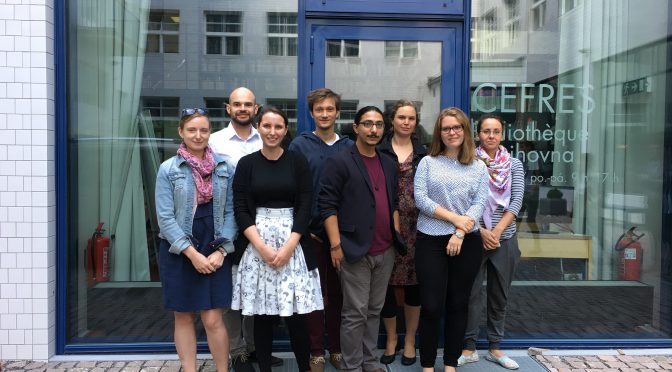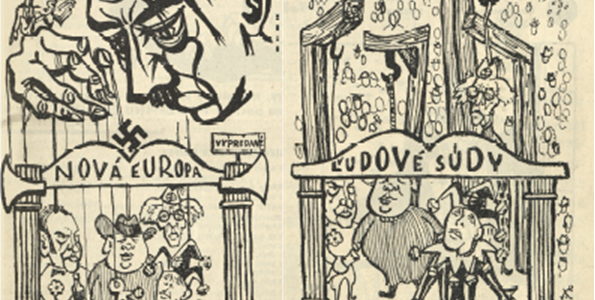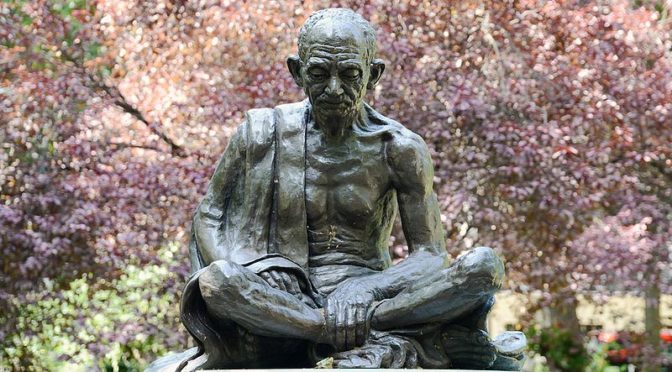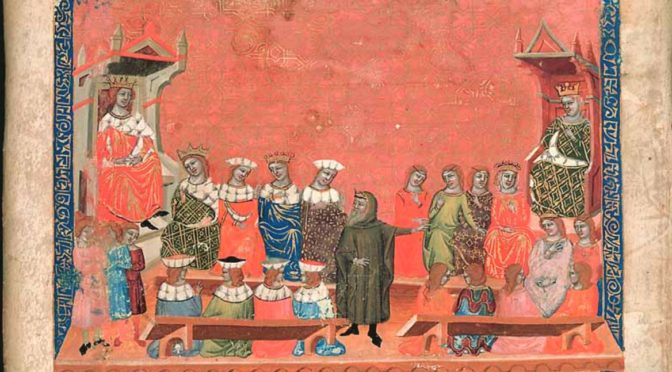
Program
9:30 Clara Royer: Introduction
10:00 Martin Pjecha: The Táborites in Christian apocalypticism
10:35 Adéla Klinerová: Reception of French Early Modern Architecture within 19th-Century Historicism in the Czech Lands and Central Europe
11:05 Break
11:20 Dan Cîrjan: Regulating Citizenship through Debt in 1920s Romania
12:05 Florence Vychytil-Baudoux: Studying Polonia from a transnational perspective: reconciling unity and diversity
12:40 Lunch break
14:00 Julien Wacquez: The Implementation of Fiction Within Science: the Case Study of the Dyson Sphere
15:35 Yuliya Moskvina: State, Squat, Society: the limits to urban commons
16:10 Aníbal Arregui: Editorial Boar: Animal Amendements on Barcelona Urban Relationality
16:45 Break
17:00 Anna Gnot: Indirect and direct autobiographism in the late work of Ota Filip (2000-2018)
17:35 Thomas Mercier: The Threshold of Europe: Derrida in Prague

A lecture by István Pál Ádám (CEFRES) in the frame of the seminar on Modern Jewish History of the ÚSD AV ČR and CEFRES in partnership with the Jewish Museum.
Where: CEFRES library – Na Florenci 3, 110 00 Prague 1
When: 5 pm to 7 pm
Language: English
Abstract
During the Second World War, Budapest concierges (in Hungarian, házmester, in Czech, domovník) were a link between the authorities and most Jewish citizens living in the city. This role grew in importance, especially in summer 1944, when a dispersed Budapest ghetto was formed from some 2,000 individual apartment buildings. In his paper, István Pál Ádám seeks to explain the circumstances in which these concierges could acquire a good deal of assets by trying to help the persecuted Jews to survive.

A lecture by Michala Lônčíková (Comenius University, Bratislava) in the frame of the seminar on Modern Jewish History of the Institute of Contemporary History (AV ČR) and CEFRES in partnership with the Masaryk Institute (AV ČR).
Where: CEFRES library, Na Florenci 3, 110 00 Prague 1
When: from 5 pm to 6:30 pm
Language: English
Similarly to other European countries that, immediately after the war, were facing the aftermath of German occupation and collaboration, a system of retributive justice was established in the restored Czechoslovakia as well. Even though anti-Jewish atrocities did not represent an exclusionary question in the lawsuits in the newly established People’s Courts, racially motivated crimes in general were covered in various paragraphs of the main retributive regulation, no. 33/1945 Sb. n. SNR. Analysing the trials of the main political representatives of the wartime Slovak State, which were held in the National Court, partly enables one to trace out the official anti-Jewish policy and its mechanisms at the state level. On the other hand, regional cases, which were in the jurisdiction of the District People’s Courts, also raise the question of the responsibility of local aggressors, co-perpetrators, and eye-witnesses amongst the Slovak majority. This microhistorical perspective is crucial for analysing the Jewish-Gentile relationships in their wider social context in the years of persecution and partly in its aftermath. Using the collections of the District People’s Court in Banská Bystrica, this presentation explores the struggle of Holocaust survivors in Slovakia for justice and the ways in which these crimes were judged in the early years after the Liberation.
Read more about the colloquia!

A lecture by Eraldo Souza Dos Santos (PhD candidate at Université Panthéon-Sorbonne, Paris, associated at CEFRES) as part of the Franco-Czech historical seminar organized by Institute for Czech History of the Faculty of Arts, Charles University (FFUK), in collaboration with CEFRES.
Venue: Faculty of Arts of Charles University, nám. J. Palacha 2, Prague 1, room 201
Time: 14 November 2019, 9:10-12:10
Language: French
Continue reading Complete Civil Disobedience. On Gandhi’s Critique of the State →

Fifth session of the 2018 common epistemological seminar of CEFRES and IMS FSV UK led by two PhD students:
Jan Koutník (FSV UK): Competitive Authoritarianism
and
Jamal Yazliyeva (FSV UK): Media Censorship
Where: CEFRES library – Na Florenci 3, 110 00 Prague 1, 3rd Floor, Entrance C
When: Thursday 19. 4. 2018 from 3:30 pm to 5 pm
Language: English
Texts:
- Levitsky and Way, Competitive Authoritarianism: Hybrid Regimes after the Cold War, Cambridge University Press, 2010, p. 1-36.
- Irum Saeed Abbasi and Laila Al-Sharqi, “Media censorship: Freedom versus responsibility. Review”, Journal of Law and Conflict 7(4), August 2015, p. 21-25.

According to the dominant understanding, the nation is a product of modernity (the Industrial Revolution, capitalism, linguistic unification, printing press generalization and the democratization of schooling, etc.). However, nations did not appear ex nihilo in the 18th century. Traditional attempts to explain this emergence do not satisfy scholars, as they focus only on the moment when the nation became the hegemonic mode of political organization during the 19th century. In doing so, they fail to describe the long process that led to this hegemony. This conference will reassess the definition and genealogy of the nation.
Date: May 3rd, 4th and 5th 2023
Location: Central European University (CEU) Campus (Vienna) & online : https://bit.ly/3TRxGjT
Organizer: Medieval Studies Department of the Central European University
Funding/co-organizers: ACRO (CEU), IMAFO (Austrian Academy of Sciences), FPPCHA (Lausanne), CRHiDI (Université Saint-Louis – Bruxelles), CEFRES (Prague) and Stadt Wien Kultur.
Language: English
Continue reading Community, Identity, Individuals: Shaping the (Political) Nation in Premodern Europe →






